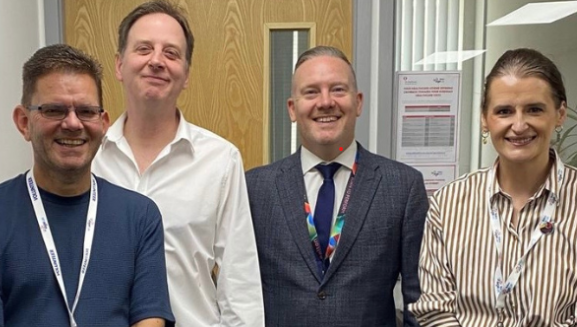CEO of Waltham Forest Community Hub, Monwara Ali asks if the real problem facing the charity sector is the lack of trust and risk appetite.
_________________________________________________________________
The narrative of a ‘talent crisis’ has gained traction in recent years, dominating board discussions, strategy sessions, and sector-wide reports. Leaders lament the difficulty of attracting and retaining top talent, citing limited pipelines and high turnover. But what if this crisis isn’t about the absence of talent, but rather the sector’s reluctance to embrace new ways of thinking, hiring, and leading?
Despite the gloomy headlines, talented professionals are not in short supply. Many are actively seeking meaningful work in organisations that align with their values. The problem isn’t their availability - it’s how the charity sector engages with them. Too often, our recruitment practices favour the familiar: candidates with sector-specific experience, traditional CVs, and predictable career paths. Transferable skills, leadership potential, and innovation from other sectors are frequently undervalued, if not outright dismissed. This signals not a crisis of talent, but a lack of trust in what new types of leaders can bring.
Charities operate under significant scrutiny, and financial pressures demand careful stewardship, but this can breed a culture of caution that impedes growth.
Risk aversion seeps into recruitment, governance, and leadership, reinforcing the status quo. Hiring an experienced corporate leader for a senior role? Too risky. Promoting an emerging leader without years in the sector? Too untested. Allowing new leaders to challenge established practices? Too uncertain. But avoiding risk is itself a risk - one that may be costing the sector its next generation of leaders.
Even when charities do identify promising candidates, they often struggle to retain them. This isn’t just about salary, though the gap with the private sector can be significant. It’s about opportunity, influence, and culture. Talented individuals leave when they feel micromanaged, undervalued, or unable to drive real change. When boards don’t trust their CEOs to lead. When innovation is treated as a threat. When governance structures slow down rather than enable progress.
If we’re serious about addressing the so-called talent crisis, we need to stop asking “Where is the talent?” and start asking: Are we looking beyond traditional hiring pools? Are we willing to take risks on high-potential leaders with unconventional backgrounds? Are we building cultures that reward courage and creativity? Are our boards empowering, rather than controlling, the executive?
A call to action
Charities need to reframe how they think about talent, not as something elusive, but as something that must be nurtured, trusted, and supported. That means:
• Modernising recruitment practices to value diverse experiences and fresh perspectives.
• Investing in leadership development, particularly for underrepresented groups.
• Fostering a culture of trust, where people are empowered to lead and innovate.
• Recognising that taking strategic risks is not reckless - it’s necessary.
Otherwise, what I have seen happening a lot with charities is their inability to imagine beyond their current circumstances and reluctance to move forward and grow, due to lack of funds. The unknown is always scary and difficult to navigate.
In conclusion, we don’t have a talent crisis. We have a crisis of imagination, trust, and willingness to evolve.
The talent is there, in our communities, in other sectors, and within our own ranks. However, if we continue to cling to outdated models and risk-averse mindsets, we’ll continue to lose the very people who could lead us forward.
The question is no longer whether we can find the right talent - it’s whether we’re ready to let them lead.
Latest News
-
Tributes paid to 'tenacious campaigner' who co-founded Terrence Higgins Trust
-
Man who set up fake animal charity jailed for five years
-
X-odus sparks video content boom among charities, report finds
-
Charity handed £25m endowment from autistic philanthropist to help others on the spectrum
-
Civil Society Covenant blighted by delays and U-turns, report warns
-
More than 30 jobs at risk as hospice charity looks to close home care service
Charity Times video Q&A: In conversation with Hilda Hayo, CEO of Dementia UK
Charity Times editor, Lauren Weymouth, is joined by Dementia UK CEO, Hilda Hayo to discuss why the charity receives such high workplace satisfaction results, what a positive working culture looks like and the importance of lived experience among staff. The pair talk about challenges facing the charity, the impact felt by the pandemic and how it's striving to overcome obstacles and continue to be a highly impactful organisation for anybody affected by dementia.
Charity Times Awards 2023
Mitigating risk and reducing claims

The cost-of-living crisis is impacting charities in a number of ways, including the risks they take. Endsleigh Insurance’s* senior risk management consultant Scott Crichton joins Charity Times to discuss the ramifications of prioritising certain types of risk over others, the financial implications risk can have if not managed properly, and tips for charities to help manage those risks.
* Coming soon… Howden, the new name for Endsleigh.
* Coming soon… Howden, the new name for Endsleigh.
Better Society

© 2021 Perspective Publishing Privacy & Cookies














Recent Stories